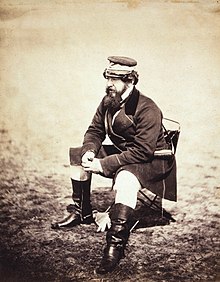William Howard Russell
Sir William Howard Russell, CVO (28 March 1827 – 10 February 1907) was an Irish reporter with The Times, and is considered to have been one of the first modern war correspondents. He spent 22 months covering the Crimean War, including the Siege of Sevastopol and the Charge of the Light Brigade. He later covered events during the Indian Rebellion of 1857, the American Civil War, the Austro-Prussian War, and the Franco-Prussian War. His dispatches from Crimea to The Times are regarded as the world's first war correspondence.

Quotes
edit- The impression produced by the size of his extremities, and by his flapping and wide projecting ears, may be removed by the appearance of kindliness, sagacity, and the awkward bonhommie of his face; the mouth is absolutely prodigious; the lips, straggling and extending almost from one line of black beard to the other, are only kept in order by two deep furrows from the nostril to the chin; the nose itself — a prominent organ — stands out from the face, with an inquiring, anxious air, as though it were sniffing for some good thing in the wind; the eyes dark, full, and deeply set, are penetrating, but full of an expression which almost amounts to tenderness; and above them projects the shaggy brow, running into the small hard frontal space, the development of which can scarcely be estimated accurately, owing to the irregular flocks of thick hair carelessly brushed across it.
- My Diary: North and South (1863), ch. 5, p. 38, describing Abraham Lincoln
- I saw a steady stream of men covered with mud, soaked through with rain, who were pouring irregularly, without any semblance of order, up Pennsylvania Avenue towards the Capitol. ... I ran down-stairs and asked an "officer," who was passing by, a pale young man, who looked exhausted to death, and who bad lost his sword, for the empty sheath dangled at his side, where the men were coming from. "Where from? Well, sir, I guess we're all coming out of Virginny as fast as we can, and pretty well whipped too." "What! the whole army, sir?" "That's more than I know. They may stay that like. I know I'm going home. I've had enough of fighting to last my lifetime."
- Why Beauregard does not come I know not, nor can I well guess. ... The inmates of the White House are in a state of the utmost trepidation, and Mr. Lincoln... in despair...
- My Diary: North and South (1863), ch. 51, pp. 467, 470, describing the aftermath of First Manassas
See also
editExternal links
edit- Encyclopedic article on William Howard Russell on Wikipedia